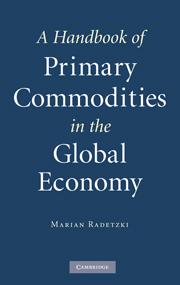Book contents
- Frontmatter
- Contents
- List of figures
- List of tables
- Acknowledgments
- Introduction
- 1 The historical framework
- 2 The geography of commodity production and trade
- 3 Comparative advantage and the trade policy distortions
- 4 Price formation and price trends in commodities
- 5 The commodity exchanges, commodity investments, and speculation
- 6 The economics of exhaustible resource depletion
- 7 Fears of, and measures to assure, supply security
- 8 Producer cartels in international commodity markets
- 9 Public ownership in primary commodity production
- 10 The monoeconomies: issues raised by heavy dependence on commodity production and exports
- References
- Index
10 - The monoeconomies: issues raised by heavy dependence on commodity production and exports
Published online by Cambridge University Press: 23 June 2009
- Frontmatter
- Contents
- List of figures
- List of tables
- Acknowledgments
- Introduction
- 1 The historical framework
- 2 The geography of commodity production and trade
- 3 Comparative advantage and the trade policy distortions
- 4 Price formation and price trends in commodities
- 5 The commodity exchanges, commodity investments, and speculation
- 6 The economics of exhaustible resource depletion
- 7 Fears of, and measures to assure, supply security
- 8 Producer cartels in international commodity markets
- 9 Public ownership in primary commodity production
- 10 The monoeconomies: issues raised by heavy dependence on commodity production and exports
- References
- Index
Summary
This chapter is devoted to the special problems encountered by nations that are heavily dependent on a small group of commodities, or, in the extreme case, reliant on a single commodity (monoeconomies). I begin by discussing the measures of commodity dependence and define the monoeconomies in the process. I then turn to exploring the problems of export instability, of fiscal extraction, and of exchange rate policies that often arise in commodity-dependent countries. I finally deal with the Dutch Disease and the resource curse, two ailments of particular significance to monoeconomies.
Measurement of commodity dependence
The degree of national dependence on primary commodities can be measured in a variety of ways. One can alternatively try to establish the share of the commodity sector in GDP, or in investments, employment, government income, or exports. The nature of the production and consumption of a specific commodity composition will influence the level of the alternative measures. Among commodities accounting for an equal share of GDP, one that is capital intensive (petroleum extraction) will normally account for a higher share of investments and a lower share of employment than another that is labor intensive (coffee). All else alike, the share of government revenue will vary with the generation of rent in the production of a specific commodity. Even when dependence measured by the share of GDP or of employment is high, the export dependence could be limited if most of the commodity is consumed at home (rice in Bangladesh).
- Type
- Chapter
- Information
- A Handbook of Primary Commodities in the Global Economy , pp. 188 - 215Publisher: Cambridge University PressPrint publication year: 2008



